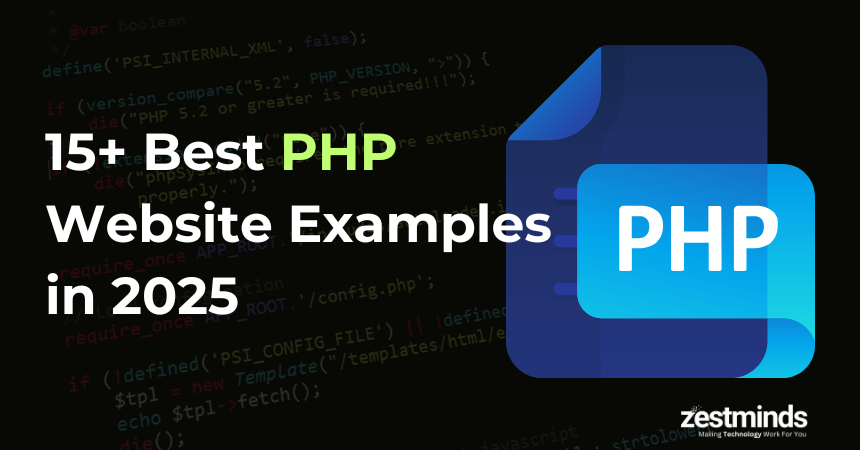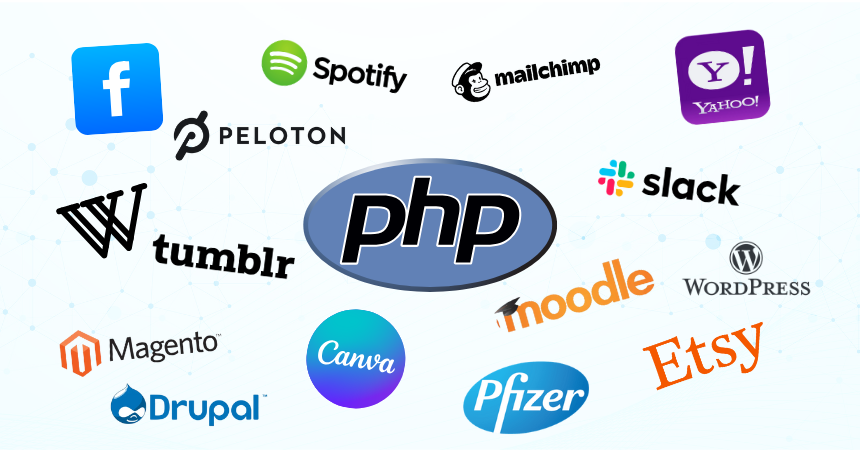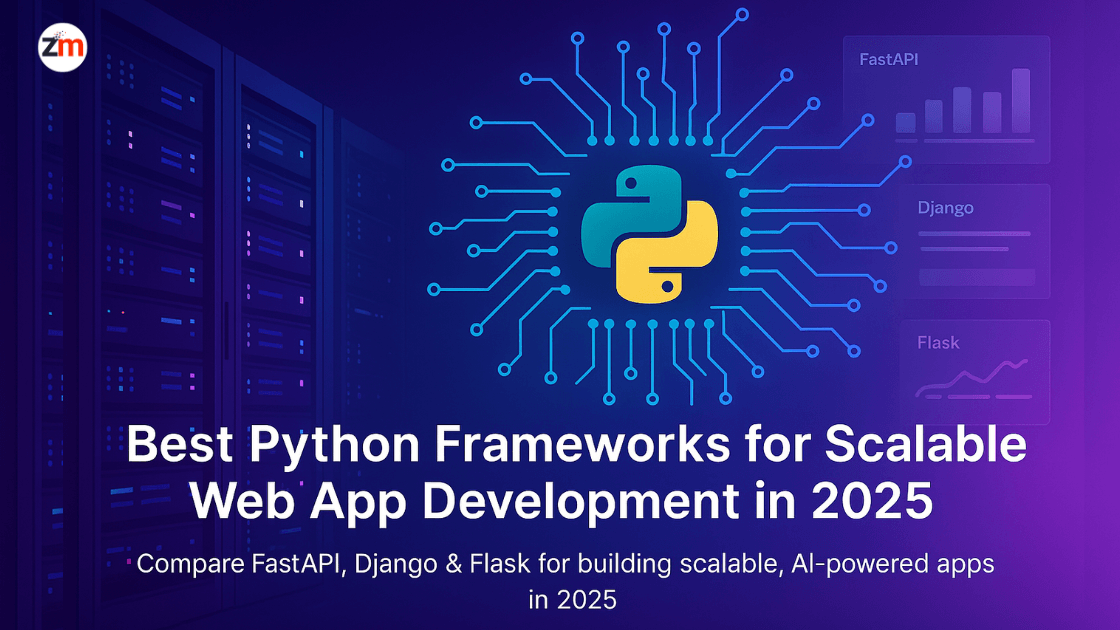Top PHP Website Examples in 2025 That Still Power the Web
PHP is far from dead, in fact, it's the silent powerhouse behind some of the world’s most visited websites. In 2025, brands like Facebook, Wikipedia, and Mailchimp still rely on PHP to deliver speed, scalability, and security at global scale. Whether you're building a startup MVP or scaling an enterprise-grade application, PHP offers the flexibility and reliability needed to get your product to market fast. In this blog, we’ll explore 15+ successful PHP-powered websites that prove its ongoing dominance, and show how you can use the same tech stack to build your next big idea.

What Makes PHP a Powerful Choice for Web Development in 2025?
PHP remains a dominant force in web development, with over 77% of websites using PHP as their backend scripting language. Despite competition from newer technologies like Node.js and Python, PHP continues to thrive due to its simplicity, flexibility, and widespread hosting support.
Several of the world's most popular websites, including Facebook, Wikipedia, and Slack, still leverage PHP because of its ability to:
- Handle high traffic efficiently with robust backend processing.
- Provide fast performance through optimized execution.
- Integrate seamlessly with databases like MySQL and PostgreSQL.
So why do businesses and developers still trust PHP in 2025? Let's explore.
15+ Top PHP Website Examples in 2025 (Proven Success Stories)

To showcase PHP's capabilities, let's take a deep dive into the top brands still powered by PHP and why they continue to use it.
Facebook – The Social Media Giant Built on PHP
Facebook, with its 3 billion+ active users, was originally built using PHP. Over time, it developed its own HHVM (HipHop Virtual Machine) to optimize PHP performance. Today, PHP still plays a vital role in Facebook's backend operations.
Why Facebook Uses PHP:
- PHP dynamically handles millions of active connections at any moment.
- Facebook's internal PHP framework, Hack, improves execution speed and security.
Dev Tip: Facebook’s Hack framework is a PHP derivative for speed and type safety.
Wikipedia – Managing Millions of Daily Queries with PHP
Wikipedia is one of the largest knowledge repositories in the world, with over 6 million articles in English alone. Its LAMP (Linux, Apache, MySQL, PHP) stack allows for smooth scalability and rapid content retrieval.
PHP's Role in Wikipedia:
- Handles high traffic demands efficiently, ensuring fast content loading.
- Supports multi-language compatibility, making Wikipedia accessible worldwide.
Slack – A Real-Time Communication App Powered by PHP
Slack, used by millions of businesses globally, still relies on PHP for its backend messaging system.
Why PHP Works for Slack:
- Enables real-time communication with low latency.
- Easily integrates with multiple APIs and third-party services.
Yahoo – A Legacy Platform Still Thriving with PHP
Yahoo was one of the earliest adopters of PHP, and despite adding other languages, it continues using PHP for various services, including Yahoo Mail and Yahoo Answers.
What Makes PHP Essential for Yahoo?
- Security-first approach to protect user data.
- Handles millions of daily requests smoothly.
Etsy – Scaling E-Commerce with PHP's Flexibility
Etsy, a leading online marketplace, leverages PHP for faster page loading and search query processing.
How PHP Powers Etsy:
- Implements HHVM to improve efficiency.
- Uses PHP static analysis tools to identify bugs and improve security.
Need a PHP team that delivers like these brands?
Zestminds builds secure, scalable PHP apps for startups and enterprises alike.
Book a Free Consultation
WordPress – Why PHP Still Dominates the CMS Market
WordPress powers 43% of all websites, making it the most widely used CMS. It operates on PHP and MySQL, offering flexibility, easy customization, and scalability.
Key PHP Benefits for WordPress:
- Seamless plugin integration using PHP-based APIs.
- Dynamic content management for blogs, e-commerce, and business websites.
Tumblr – Social Blogging with PHP Efficiency
Tumblr is a microblogging and social networking site that relies heavily on PHP to deliver dynamic content at scale.
Why PHP is Essential for Tumblr:
- Manages millions of posts daily without performance drops.
- Uses PHP return-type declarations to streamline functionality.
MailChimp – Managing Mass Email Campaigns
MailChimp, a leader in email marketing, uses PHP to handle bulk email distribution without downtime.
PHP's Strength in MailChimp:
- Scales email handling for millions of users.
- Ensures smooth API integrations for email automation.
Looking to build a scalable application like these PHP-powered giants? Learn more about our custom PHP development services and how we help startups and enterprises launch faster.
Spotify – PHP's Role in Music Streaming
Spotify, one of the biggest music streaming platforms, uses PHP in its backend for quick data retrieval and content management.
Spotify's PHP Features:
- Optimized database queries using PHP frameworks.
- Efficient handling of user-generated playlists and searches.
Magento (Adobe Commerce) – A PHP-Based E-Commerce Leader
Magento (now Adobe Commerce) is one of the leading PHP-based eCommerce solutions, providing businesses with a flexible platform to manage online stores.
PHP Benefits in Magento:
- Customizable for various business models.
- Uses PHP frameworks like Symfony for performance optimization.
Pfizer – A Pharmaceutical Giant Using PHP
Pfizer uses PHP and Laravel to maintain its global web infrastructure and secure access to critical pharmaceutical information.
Why Pfizer Chooses PHP:
- Streamlined content updates for global accessibility.
- Ensures data security and compliance with medical regulations.
Peloton – Fitness Meets PHP
Peloton, a SaaS fitness brand, ensures smooth content delivery across global fitness enthusiasts using PHP.
PHP Benefits for Peloton:
- Handles real-time workout streaming efficiently.
- Enables personalized fitness content for users.
Moodle – A PHP-Powered Learning Management System
Moodle is one of the most widely used PHP-based LMS platforms for universities and institutions.
How PHP Helps Moodle:
- Enables plugin-based customization for educators.
- Scales efficiently for millions of students.
Canva – Revolutionizing Design with PHP
Canva, a graphic design tool, initially built its backend using PHP, later integrating Node.js for additional functionality.
PHP's Role in Canva:
- Manages dynamic template rendering.
- Handles multi-user collaboration efficiently.
Drupal – Open-Source CMS Powered by PHP
Drupal, known for highly secure and scalable websites, runs entirely on PHP and the Symfony framework.
Why PHP is Key for Drupal:
- Modular structure for customizations.
- Trusted for government and enterprise-level security.
Why Do Leading Brands Still Use PHP?
- Scalability: PHP frameworks like Laravel enable websites to scale with high traffic.
- Cost-Effective: Being open-source, PHP reduces development and hosting costs.
- Security Enhancements: Modern PHP versions include built-in security features to prevent vulnerabilities.
- Strong Community Support: With a massive developer community, PHP enjoys continuous improvements and updates.
How to Build a Scalable PHP Website Like These Top Brands
- Choose the Right PHP Framework: Laravel, Symfony, and CodeIgniter are great options.
- Optimize Performance: Use Redis and Memcached caching mechanisms to improve efficiency.
- Follow Security Best Practices: Implement SSL encryption, secure authentication, and proper data validation methods.
- Leverage Cloud Hosting: PHP works well with AWS, Google Cloud, and DigitalOcean.
Frequently Asked Questions (FAQs)
1. What Are Some Popular Websites Built with PHP?
Many top brands still rely on PHP for their backend, including Facebook, Wikipedia, WordPress, Slack, Yahoo, and Etsy. These websites leverage PHP for scalability, security, and fast performance, making it a preferred choice for high-traffic platforms.
2. Is PHP Still Relevant in 2025 for Web Development?
Yes, PHP remains highly relevant in 2025, powering over 77% of websites worldwide. Modern PHP versions come with improved speed, security features, and support for cloud-based applications, making it a great choice for scalable web development.
3. Why Do Large Enterprises Still Use PHP?
Large enterprises use PHP because of its cost-effectiveness, flexibility, and compatibility with modern frameworks like Laravel, Symfony, and CodeIgniter. PHP's strong community support and continuous updates also make it a reliable option for enterprise applications.
4. What Are the Advantages of Using PHP for Website Development?
- Open-source & cost-effective
- Fast development with built-in functions
- Seamless database integration (MySQL, PostgreSQL, etc.)
- Scalability with frameworks like Laravel
- Strong security measures in newer versions (PHP 8.x)
5. Which PHP Framework Is Best for Large-Scale Web Applications?
- Laravel – Best for enterprise-level applications
- Symfony – Highly flexible & modular framework
- CodeIgniter – Lightweight & high-speed framework
- Zend Framework – Used for complex web applications
6. Is PHP Better Than Python for Web Development?
PHP is better suited for web development due to its faster execution speed, extensive libraries, and superior hosting compatibility. Python, on the other hand, is preferred for AI, data science, and automation. If you're building a scalable web platform, PHP is often the better choice.
7. Can PHP Be Used for E-Commerce Websites?
Yes! PHP is widely used for e-commerce websites, with platforms like Magento (Adobe Commerce), WooCommerce (WordPress), and OpenCart relying on PHP for their core functionalities. PHP allows for secure transactions, fast performance, and seamless integrations.
8. How Does PHP Compare to Node.js for Backend Development?
| Feature | PHP | Node.js |
|---|---|---|
| Speed | Faster execution for dynamic web pages | Better for real-time applications |
| Ease of Use | Easier for beginners | Requires knowledge of JavaScript |
| Hosting Support | Widely supported on shared hosting | Requires VPS or dedicated hosting |
| Scalability | Scales well with frameworks | More scalable for microservices |
9. What Security Features Does PHP Offer for Web Applications?
- Data encryption for protecting sensitive user data
- SQL injection prevention with prepared statements
- Cross-Site Scripting (XSS) protection with input validation
- Authentication & session management for secure logins
10. How Can I Optimize My PHP Website for Speed & Performance?
- Use caching mechanisms (Redis, Memcached)
- Optimize database queries with indexing
- Minimize HTTP requests & use a Content Delivery Network (CDN)
- Upgrade to the latest PHP 8.x version for speed improvements
- Enable Gzip compression & browser caching
What's inside
Want to Build a High-Performance PHP Website?
Get expert PHP development tailored to your business needs.
Get a Free PHP Consultation
Rajat Sharma
About the Author
With over 8 years of experience in software development, I am an Experienced Software Engineer with a demonstrated history of working in the information technology and services industry. Skilled in Python (Programming Language), PHP, jQuery, Ruby on Rails, and CakePHP.. I lead a team of skilled engineers, helping businesses streamline processes, optimize performance, and achieve growth through scalable web and mobile applications, AI integration, and automation.
Stay Ahead with Expert Insights & Trends
Explore industry trends, expert analysis, and actionable strategies to drive success in AI, software development, and digital transformation.


